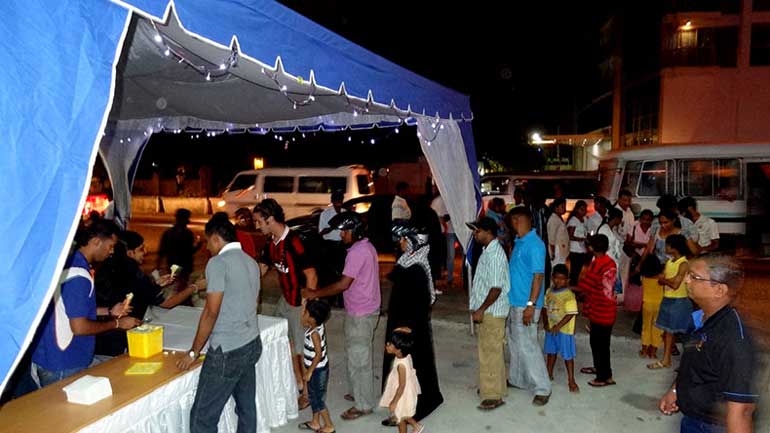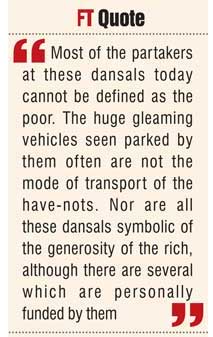Tuesday Feb 17, 2026
Tuesday Feb 17, 2026
Thursday, 14 May 2015 01:43 - - {{hitsCtrl.values.hits}}
“Your daily life is your temple and your religion. Whenever you enter into it take with you your all. Take the plough and the forge and the mallet and the lute, the things you have fashioned in necessity or for delight. For in reverie you cannot rise above your achievements nor fall lower than your failures”
- Kahlil Gibran

 An Englishman, fascinated by the many dansals in the city during the recent Wesak holidays had many a question.
An Englishman, fascinated by the many dansals in the city during the recent Wesak holidays had many a question.
“Are the people lining up in front of these Dansals the poor? Are these Dansals run by the rich? Why cannot they be run through the year? Are they run by volunteers?” he asked.
As straightforward as they sounded, I soon realised that in answering the questions several of my own long-held but unexamined perceptions of these popular open houses and even ideas about the role of religion in our society were challenged.
If you were to go by the number of religious establishments and functions in the country, we are very much a spiritually-inclined people. Most public gatherings - State, business enterprises, schools and even sports events - begin with some kind of religious observance. To a foreign eye it may appear that we are a bastion of spiritual and moral strength, the most devout being the social ‘leaders’ who inevitably play a prominent role at these observances. But a little probing will soon show that ceremonies and rituals are not an indication of spiritual strength at all.
Turn to any newspaper or TV channel, a very different picture emerges. It is a grim image of an all-encompassing political/government/business leadership which is corrupt, financially, morally or both. A sordid story of bribes and commissions, favouritism or blatant nepotism, conflict of interest situations, abuse of power and State property, unreasonable interference in the functioning of the Government machinery including the Police (and perhaps even the courts), making a life-long career out of politics, violence and thuggery are the commanding features we are confronted with in this scene.
How do we reconcile this appearance of a general and mass spiritual quest with the gross reality of a society in decay? The same hand that receives the bribe in the morning offers the sacred flowers at the temple in the evening. There is an obvious moral confusion if not a sickening indifference to the truth here.
 Most of the partakers at these dansals today cannot be defined as the poor. The huge gleaming vehicles seen parked by them often are not the mode of transport of the have-nots. Nor are all these dansals symbolic of the generosity of the rich, although there are several which are personally funded by them. But many more are the efforts of small communities, collecting the necessary funds by means of ‘lists’, a door-to-door effort in the neighbourhood. Helping out at a dansala is strictly voluntary; there is no question of payment.
Most of the partakers at these dansals today cannot be defined as the poor. The huge gleaming vehicles seen parked by them often are not the mode of transport of the have-nots. Nor are all these dansals symbolic of the generosity of the rich, although there are several which are personally funded by them. But many more are the efforts of small communities, collecting the necessary funds by means of ‘lists’, a door-to-door effort in the neighbourhood. Helping out at a dansala is strictly voluntary; there is no question of payment.
It is most likely that at the beginning, Wesak dansals were a pure and simple effort at charity where the rich fed the poor. In our life time we have observed the country progressing from a very poor status to a reasonable $ 3000 plus per capita income today.
Those who have a memory of the early 1970s will recall an era when it was common to see indigent persons scavenging rubbish bins for food. To buy a shirt a person had to obtain a permit from the ‘authorities’. Considering the kind of ‘policy’ followed by the then-government it was only to be expected that the economy stagnated while the rate of unemployment was extremely high.
Thankfully, such grinding poverty seems to have disappeared in the following (four) decades. In Sri Lanka now the percentage of those living below the poverty line is said to be about 2%, if not less. Unemployment seems well under control, with almost a million able bodied Sri Lankans working overseas.
But yet the dansals have not lost their appeal. On the contrary they seem to be flourishing, becoming an essential aspect of the annual Wesak celebrations which mark the greatest event in the Buddhist calendar. The reality that there are only a handful of the real poor who need to be fed, and of the feeders very many hardly qualifying to the definition of the rich, seem to matter little. In actual fact a very large number of those partaking of the fare at dansals are revelers, out to see the Wesak celebrations; the pandols, decorations, musical shows.
‘Cultural’ and ‘political’ elements
This does not mean there is no spiritual dimension to the exercise today. As the Englishman later observed, there is an attractive spontaneity in the givers and an appreciative enjoyment in the partakers which is uplifting. The atmosphere at a dansala is not that of a meager soup kitchen feeding the near-starving but of a gaiety, only somewhat tempered, on account of the hallowed occasion. It is a giving towards a multitude of strangers, nothing expected in return.
But there are inescapable ‘cultural’ and ‘political’ elements even in an everyday event like a dansala. The foreigner will perhaps miss the ‘cultural’ element of the formal ‘opening’ of the dansala and the politicisation of the event with the invariable invitation to a politician of some import to grace the occasion. It is most unlikely that the ‘chief guest’ politician would contribute towards the dansala but will only bless it (or perhaps bless the organiser) with his presence.
Having surrendered to a system so abjectly, we have become a society merely reflecting the ethics of our politics; mediocre, selfish, cunning - ceremony and ritual taking precedence, the public face becoming the only thing that matters.
Is the incongruity of the not-so-rich feeding the not-so-poor under the aegis of the not-so-honest politician, a sign of the times? The symbols of religion - the temples, orders of monks, even the dansals - seem fatally infected by the pervasive political culture. But in critiquing the infection, do we miss the point altogether? Is what is so obvious without, something inherent within?
Religion after all is about the truth, the essence. While we find no fault with the dansals, no real religious experience can have meaning until we make our life our temple, a prospect only a very few today can honestly aspire to. We must then accept that in our eternal quest for deliverance “we cannot rise above our ‘achievements’ nor fall below our ‘failures’.